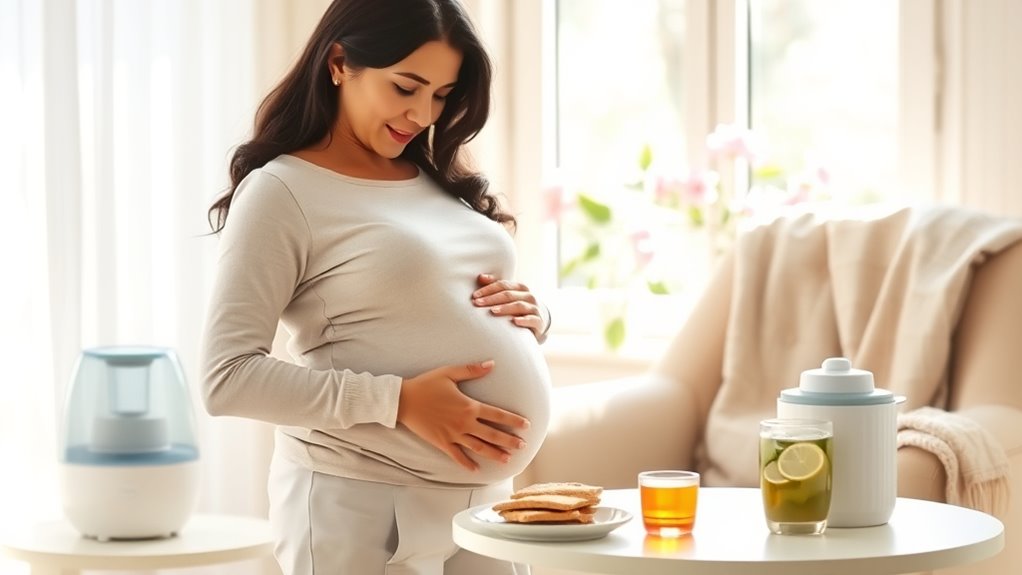Managing pregnancy allergies can be challenging, but you can take steps to ease flare-ups. Identify your triggers, like pollen or pet dander, and minimize exposure during peak times. Safe medications like loratadine or nasal sprays can help relieve symptoms. Keep your home clean and use air purifiers to reduce allergens. Staying hydrated is also important. With knowledge of these strategies, you’ll find ways to manage your symptoms effectively. Learn about more tips for a smoother experience!
Key Takeaways
- Identify and avoid common allergens such as pollen, dust mites, and pet dander to reduce flare-ups during pregnancy.
- Use safe antihistamines like loratadine or cetirizine, and consult your healthcare provider before any medication.
- Implement lifestyle changes, such as using air purifiers and staying indoors during high pollen counts, to manage symptoms.
- Recognize the difference between pregnancy rhinitis and allergies, as rhinitis is caused by hormonal changes and not allergens.
- Maintain a clean environment and stay hydrated to help alleviate congestion and support overall wellness during pregnancy.

Managing pregnancy allergies can feel overwhelming, especially since your immune system is more sensitive during this time. You might notice that you’re sneezing more, or your eyes are itchier than usual. Some women even develop allergies for the first time during pregnancy. Hormonal changes are often to blame, as they can amplify your allergic reactions. Additionally, pregnancy rhinitis might add to your discomfort, causing nasal congestion without being an actual allergy. It’s essential to distinguish between these issues to manage them effectively.
Identifying what triggers your allergy symptoms is crucial. Common culprits include pollen, dust mites, pet dander, and certain foods. Pay attention to environmental factors, too—cigarette smoke and strong odors can provoke reactions. If you’re dealing with seasonal allergies, remember that high pollen counts typically occur between 5 AM and 10 AM, so plan your outdoor activities accordingly. Inside your home, be mindful of mold and pet dander, which can also lead to flare-ups.
Identifying allergy triggers, like pollen and dust mites, is essential for managing symptoms during pregnancy.
While it’s tempting to reach for medications, not all are safe during pregnancy. Antihistamines like loratadine (Claritin) and cetirizine (Zyrtec) are generally considered safe, as are nasal sprays like Flonase and Nasonex. Saline sprays can help alleviate congestion without any risks. However, steer clear of decongestants like Sudafed, especially during the first trimester. Always consult your healthcare provider before taking any medication to ensure it’s safe for you and your baby.
Lifestyle adjustments can significantly help in managing your allergies. Try to minimize exposure to known allergens by staying indoors when pollen counts are high. Using air purifiers can reduce indoor allergen levels, while drinking plenty of fluids helps thin mucus, making it easier to deal with congestion. If you have food allergies, be vigilant about reading labels and avoiding any allergens.
Be aware that pregnancy rhinitis is different from typical allergies. Its symptoms, like nasal congestion and a runny nose, stem from hormonal changes rather than allergens. Antihistamines won’t help in this case, and symptoms usually resolve postpartum. It’s always a good idea to consult your healthcare provider for proper diagnosis and management.
If you’re undergoing immunotherapy, you can often continue your allergy shots during pregnancy, but don’t start new treatments without a thorough risk assessment from your doctor. Keep a close watch on your symptoms and follow your healthcare provider’s guidance for the best outcomes.
With these strategies, managing your pregnancy allergies can become more manageable, allowing you to focus on the exciting journey ahead.
Frequently Asked Questions
Can Pregnancy Allergies Affect My Baby’s Development?
Yes, pregnancy allergies can affect your baby’s development.
When you’re exposed to allergens, they can transfer to your fetus, potentially leading to sensitization and increasing allergy risks later.
Your immune system’s response during pregnancy, particularly its Th2 dominance, plays a crucial role in shaping your baby’s immune system.
Additionally, factors like your diet and exposure to environmental allergens can further influence your baby’s development and overall allergy susceptibility.
Are There Specific Allergy Medications Safe During Pregnancy?
Yes, there are specific allergy medications considered safe during pregnancy.
You can use antihistamines like loratadine (Claritin) and cetirizine (Zyrtec). Corticosteroid nasal sprays, such as Flonase, are also safe. Saline nasal sprays and plain Mucinex (guaifenesin) can help relieve symptoms.
However, avoid decongestants and antihistamine nasal sprays, as their safety hasn’t been established. Always consult your healthcare provider before starting any medication during pregnancy to ensure it’s appropriate for your situation.
How Can I Identify My Allergy Triggers While Pregnant?
Did you know that about half of pregnant women become sensitized to at least one allergen?
To identify your allergy triggers while pregnant, start by keeping a detailed symptom diary. Note when symptoms occur and any potential exposures, like pollen or pet dander.
Allergy testing, such as skin or blood tests, can also help pinpoint specific triggers.
Always consult your healthcare provider for guidance on managing your symptoms effectively.
Can Food Allergies Change During Pregnancy?
Food allergies don’t typically change during pregnancy; if you’ve had an allergy before, it’ll likely remain the same.
You might notice your symptoms vary in intensity, though, due to hormonal shifts. While new allergies can develop, they’re less common.
It’s important to stay aware of how your body reacts to food and consult your healthcare provider for guidance on managing any flare-ups during this time for your comfort and safety.
Is It Safe to Undergo Allergy Testing While Pregnant?
Isn’t it curious how your body can change so much during pregnancy?
When it comes to allergy testing, you’ll be relieved to know it’s generally safe. Skin tests are non-invasive and pose minimal risks, especially under professional supervision.
Identifying your allergies can help you manage symptoms effectively and avoid unnecessary medications.
Just remember, if you’ve had severe reactions in the past, you should consult your healthcare provider before proceeding with any testing.
Conclusion
Managing pregnancy allergies can feel overwhelming, but with the right strategies, you can find relief. Staying informed about potential triggers and working closely with your healthcare provider can make a significant difference. Have you considered how small adjustments in your daily routine could lead to a more comfortable pregnancy? By prioritizing your health, you not only care for yourself but also for your growing baby. Remember, you’re not alone on this journey; support is always available.









